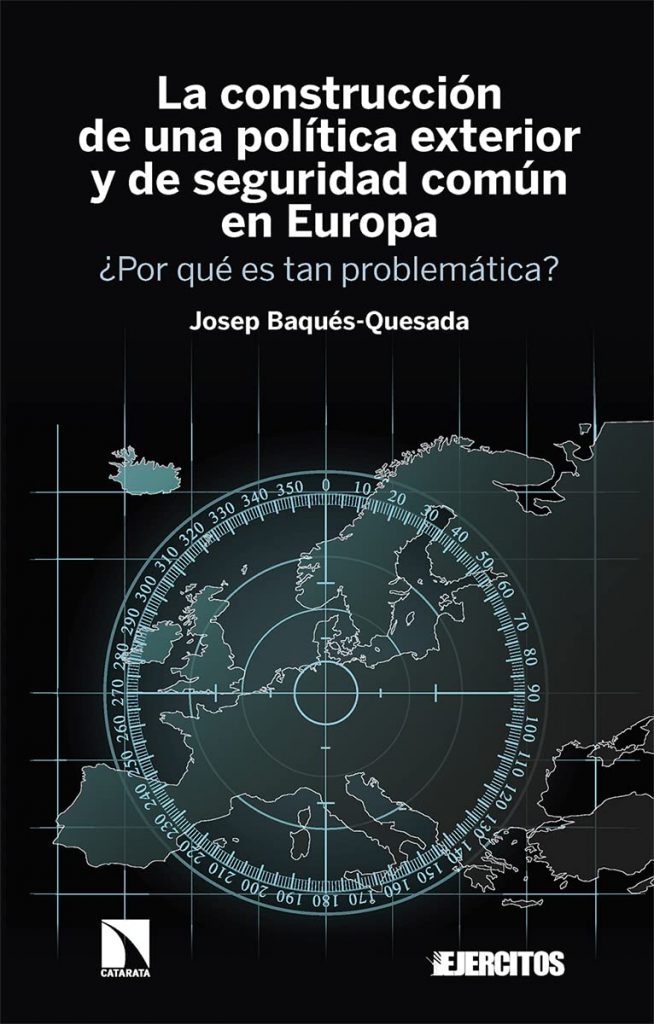
The European Union has been trying for decades to provide itself with a common foreign and security policy in accordance with its economic and demographic weight. They have been, in most cases and to the misfortune of its almost 450 million inhabitants, a succession of failures, in which at each step the level of ambition was lower. Despite this, progress has been made, especially since the Russian Federation launched an invasion of Ukraine on February 24, 2022, which has forced the Twenty-Seven to give new impetus to everything related to Defense. However, there are many factors, some of them very profound, that have so far prevented small steps from culminating in a true common defense. This book aims to identify them, leaving aside the usual "wishful thinking", prevailing among the elites who run Europe from the Brussels bubble, so that, from a solid base, it can be built.
The origin of "The construction of a common foreign and security policy in Europe: Why is it so problematic?" It lies in a recurring debate and in the need to put some order in it. The European Union's intention to become a strategic actor periodically comes to the fore, in addition to the announcement, which usually goes hand in hand with the first, that “we already have a European army.” Recently, between the United States' withdrawal from Afghanistan and Russia's entry into Ukraine, that debate has intensified. Even so, as it cannot be otherwise given the substance of the issue, there are many, both civilian and military, who wonder the reasons why the European Union fails to take off as a strategic actor worthy of the name nor is it considered such among the great powers.
In recent months from Ejercitos -and in collaboration with the Catarata publishing house- we have published two books about the war in Ukraine in which an important space has been dedicated to the changes that this has caused in the European Union, both in terms of the Common Foreign and Security Policy and, more specifically, in the Common Security and Defense Policy. Of course, also in relation to the aid granted to Ukraine, on many occasions at the limit of what is possible given the precarious nature of European arsenals. It is no coincidence, because beyond the importance that the Russian invasion of Ukraine has for the security of the 27, Europe, and more specifically European defense, are one of the reasons for the Armies' existence.
"The construction of a common foreign and security policy in Europe: Why is it so problematic?", unlike the previous two, is more of an essay, with a more friendly and sometimes even informal tone - within limits, obviously -, with which we intend not so much to offer recipes as to open a debate on the real problems of background that have been hindering - and condemning - the attempts to build a common defense. To this end, its author, Professor Josep Baqués, analyzes the strategic imperatives derived from history and geography, which affect each of the EU Member States, complicating - or perhaps even making impossible - their replacement by other common ones that serve as the basis for a unique defense project. The reader will see classic authors such as Halford John McKinder and other more modern ones pass through these pages - although elevated to the same level as the previous one - such as Samuel P. Huntington. Also to Immanuel Kant, or Arnold J. Toynbee, among many others. Of course dates and places. Illusions and frustrated dreams. Especially the latter, a constant when we talk about European defense. A phenomenon that is anything but coincidental.
Most of what is written about European construction obeys the logic of Public International Law and generally suffers from an idealistic bias that is as admirable as it is counterproductive. Making a most accurate analysis of the European reality, of the ambitions and fears of each State, of its security dilemmas, of its aspirations and imperatives, is, on the contrary, the only valid recipe if the aim is to build a Union. European Union that is, in addition to being an economic giant, a “strategic actor” and not the military dwarf that it continues to be. This is where Strategic Studies and political realism come in. The result is an openly provocative book, not at all comfortable with the dominant idealist rhetoric, since only a critical and rational vision will allow us to overcome many of the obstacles that the EU has encountered in more than 70 years of path in which its ambition in matters of Defense has, in many cases, only been reduced.
In a world in which we have gone in a short period of time from American hegemony, certainly comfortable for Europeans, to strategic competition between great powers, only by providing ourselves with a deterrence capacity - and not just conventional - that is credible and in line with Due to our size in human, economic and technological terms, we will be able to continue being a relevant and, as far as possible, autonomous actor. However, after more than three decades of collecting the “peace dividends” this cannot be done on the basis of articulating our hopes and desires – often grandiose – on paper. This is a doomed effort that rarely results in practical achievements, so it requires some underhanded work. A slow and arduous process that involves, first of all, recovering the ability to think in strategic terms, something that the younger generations have forgotten, because fortunately they have not known war; not even the “cold” one. Making this possible - for new generations to forget idealism and be able to think in terms of power - will force us to publish many more books like this one, perhaps reaching other conclusions, but on the same realistic basis.
In our case, "The construction of a common foreign and security policy in Europe: Why is it so problematic?" It is nothing more than a first step, which will be followed later by others dealing with more specific issues related to European defense. It is not a whim, but our lives depend on it. And we are not referring to the life of our small publishing business, but to that of Europeans, who run the risk of being relegated to irrelevance if they are not able to bridge their differences and cooperate in this matter as well. That is why, with the hope of contributing to an objective that goes beyond people or States, we have launched ourselves into this new adventure, knowing that the European issue, at least in relation to defense, rarely time sells. Furthermore, we have done it with the hope of forcing one to think, forcing the reader - especially the young one - to leave the common places, magical thinking and the rhetoric of the “European bubble”. If only a handful of young people are able to escape from this kind of intellectual golden cage thanks to this book, we will be satisfied.


Be the first to comment